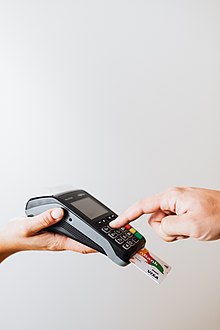A payment surcharge, also known as checkout fee, is an extra fee charged by a merchant when receiving a payment by cheque, credit card, charge card, debit card or an e-money account,[1] but not cash, which at least covers the cost to the merchant of accepting that means of payment, such as the merchant service fee imposed by a credit card company.[2] Retailers generally incur higher costs when consumers choose to pay by credit card due to higher merchant service fees compared to traditional payment methods such as cash.[3]
A surcharge may be prohibited by card issuers, such as Visa and MasterCard, but the enforcement of the prohibition is not uniform. Some jurisdictions have laws which require, allow, regulate or prohibit a merchant imposing a surcharge. If no surcharge is permitted, the merchant's costs are borne by the merchant, who may incorporate the burden in its prices. In some jurisdictions, when a customer pays with cash, the merchant may offer a discount.[4]

- ^ Department for Business, Energy & Industrial Strategy, Consumer Rights (Payment Surcharges) Regulations 2012: Guidance, section 3.1, updated in June 2018, accessed on 24 December 2024
- ^ Christensen, Tricia. "What is a Credit Card Surcharge?". Smart Capital Mind. Archived from the original on October 16, 2016. Retrieved November 7, 2016.
- ^ Schwartz, C. "Payment Costs in Australia" (PDF). RBA. Retrieved 18 October 2020.
- ^ "Cash Discounts, Credit Surcharges and Free Speech". Bloomberg.com. 2017-01-10. Retrieved 2017-11-22.
